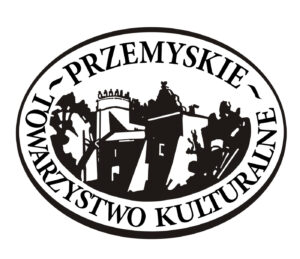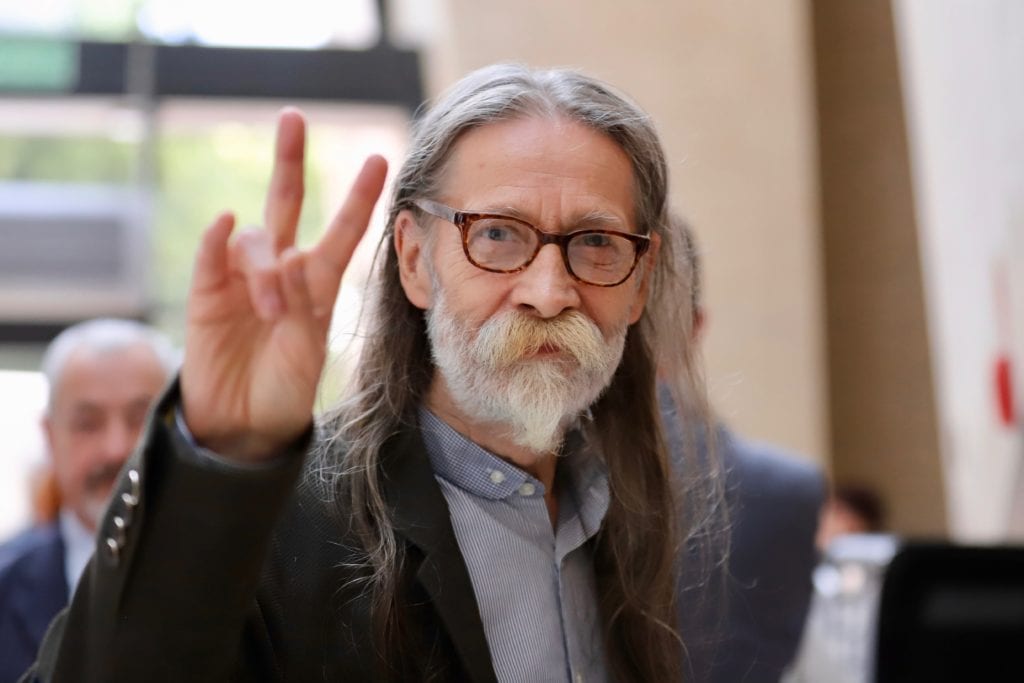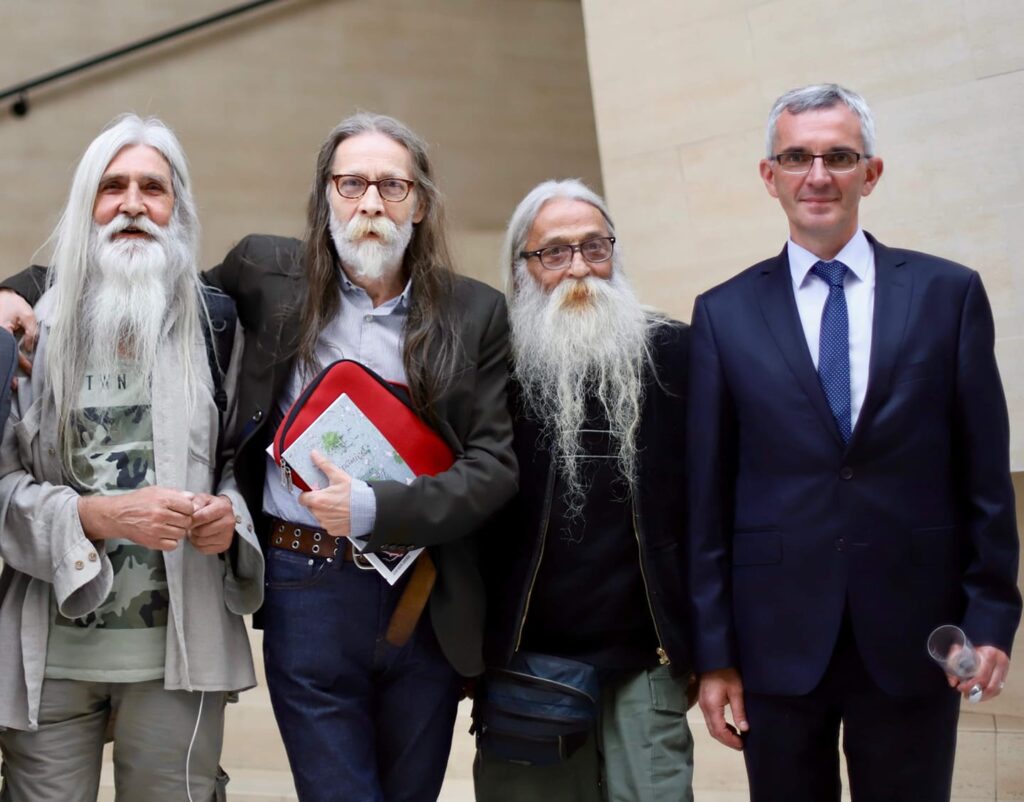March 1968, Przemysl
Introduction
In March 2008, President Lech Kaczynski organized a celebration of the 40th anniversary of March 1968. Among the 100 people from all over the world specially invited to the ceremony, as many as three were from Przemyśl. Zen Damian Zegarski, Wojciech Lach and my humble person - organizers of the youth protests in support of the Warsaw students. So Przemyśl was exceptionally honored. At the same time, it turned out that I was the youngest organizer of March in all of Poland. Lech Kaczynski, upon learning that I was 16 at the time, couldn't quite believe it and only shook his head in disbelief. In the very report of the ceremony at the National Bank of Poland on the eve of the celebration at the Presidential Palace, my photograph, in which I am greeted by NBP President Slawomir Skrzypek, is at the very top of the special edition of "Rzeczpospolita." And below it are the tumults of the democratic opposition of the People's Republic of Poland, such as Counselor Szczuka, Jan Lityński, Jacek Kleyff and others.
The facts stated above, unknown to the general public, are essential proof of the accuracy of the PTK's decision to create such a portal.
The invitation of as many as three Przemyśl residents to the ceremony testifies to the city's high profile on the map of opposition and protest against communist censorship during the communist period.
About the need for documentation
I find the idea of documenting civic activities in Przemysl 1967-1997 exceptionally useful. This is because the years up to 1989 were characterized by political censorship inherent in the system of so-called real socialism. And any information about civic or alternative activities was blocked in the media of the time.
Today, in free Poland, we have no such roadblocks and documentation activities should be carried out with the support of the Institute of National Remembrance in Rzeszow, the Society of Friends of Science in Przemysl and other research institutions, such as the University of Rzeszow, and institutions of the state acting pro memoriam.
The best example is the figure of the late Ryszard Siwiec, whose heroic act in August 1968 in opposition to the invasion of Czechoslovakia by Polish troops was already known in democratic Poland.
Doing justice to the many silent heroes who opposed the absurdities of the regime at the time, initiated actions outside the censorship, and risked their future by doing so, should be another motive for the documentation.
For in light of today's scientific knowledge, the People's Republic of Poland turned out to be financially bankrupt, as I think Prof. Krzysztof Rybinski was the first to point out on his blog on Salon24.pl in 2015-2016, and is now on Wikipedia.co.uk.
And what follows logically from the above paragraph - all those who opposed the ineffective policies of the communist authorities - were right.
Further, the need for such documentation stems from the bizarre "narrative gap" we observe when it comes to March '68. Despite the fact that the IPN has stated that the biggest brawl was in Gdansk, and that young people of working-class origin were at the forefront, a thesis about Warsaw is continually promoted, with a background of factional games within the Polish United Workers' Party. This thesis boils down, whether one likes it or not, to the fact that everything would have been fine in the People's Republic of Poland if one faction had not poured sand into the cogs of the other. That is, to a sterile analysis of the "leadership role of the party," the "dictatorship of the proletariat" and "socialist democracy."
Meanwhile, every healthy protest during the communist period was against the leadership role of the PZPR and the dictatorship of the proletariat, that is, against the takeover of the state and social life /institutions, organizations, associations, including youth/ by guys and women with "red cards."
So the strange focus on the history of the Communist Party and its factions obscures the proper history of March '68: the cities, the people, the organizers, the number of interrogations, arrests, expulsions, etc. Well, and the main goal: to show a yellow card to the communist censors and defend the striking and protesting students.
The abstract and unscientific consideration of the "leadership role of the party" and its factions leads to alienation of the observer of events: as if "Dziady" in the Warsaw theater had not really been taken off the billboard, Staszek Pyjas was killed in Cracow, in December 1970 the brawl was not provoked by introducing raises before Christmas, and at the latest in March 1980 it was not known from leaks that the debt of the People's Republic of Poland to Western banks amounted to $20 billion.
It was as if the PZPR party had some philosopher's stone of knowledge about nature and society. There was no such stone, there were constant shortages of toilet paper, queues, censorship of song lyrics, press, theatrical performances and even stupid invitations to any conference in any organization. What today is printed on a computer printer in any quantity.
The 21st Century: The Civilization of Mr. Smartphone and the 1960s: The Youth Revolution
The essential thing, in fact, the methodology of writing texts about those times is to note the differences in civilization.
Today we live in a world of global information and the Internet, where mail to the United States goes in seconds. 50 years ago, such mail would go a month if sent by sea via MS "Batory" or more than a week if sent by regular mail. Television received full coverage in Przemyśl only in the late 1960s and early 1970s after the construction of a television tower near Tatarska Gora, so the events of those years were rarely documented by anyone unless he had a knack for photography. Or he was a journalist. Therefore, relying on one's own memory is very unreliable. And I write this with full knowledge, having written several thousand articles, mentions, posts, notes, in the printed press and on the Internet. Memory is unreliable, so one should rely only on certain data that others involved in the event can easily verify, sometimes correct, add additions from themselves.
It is also beyond comprehension why it was not until 2008, almost two decades after independence, that the central commemoration of March '68 was organized. However, this fact is beyond the reach of this portal, its organizers and its participants. However, thanks to the Rzeszow IPN, we already have general data about the course of March '68 in Przemysl. Dry because dry, small because small, but they supplement our memory of those days and correct our opinion.
As for March in Przemysl, it should be noted that it was a spontaneous action, improvised, youthful, opposition of a cultural, civilizational nature. The support of Warsaw students protesting against censorship. Nothing more. It was not a political action by adults, prepared organizationally with the requirement of photographic and other documentation, calculated for political gain, political applause or to make a name for themselves in society.
March 1968, Przemyśl: on Kazimierzowska Street Zenek Zegar approaches me and...
He says: "Andrew, why don't you organize some form of protest?". That was more or less the conversation.
Zenek probably knew that I and other guys, fans of bigbit bands, used to meet at the Club on the San in the so-called Scout's House - the Youth Cultural Center.
Then I remember we listened to Jimmy Hendrix recordings from cassette tapes, I was particularly impressed at the time by the song "Foxy Lady", which reminded me a bit of the riffing on bassettas and fiddles of our Zakopane highlanders.
At that time I played drums in Przemysl bigbit bands, in 1968 I think in the band Omen, which won the first prize at the Festival of Southeastern Poland in Sanok. Or with the late Zbyszek Grygus /piano/ and Wacek Pudłocki /bass/ in the officers' casino "Granica" at dances. There we played bigbit and rock and roll and the hits of the time, alternating with the guys from the army, and we were "commanded" by a nice sergeant.
I'm also writing this because one Saturday or Sunday, when there were parties and dancing in all the clubs and restaurants, the sergeant's military drummer fell ill and came by gauze to pick us up at the "House of the Scout" to replace them on stage. We played on stage with Wacek Pudłocki and Andrzej Pelc /organs/ to dance, and our showpiece piece was Otis Reding's heavy blues "Down in the Valley". Oh it was fun!
I write this for the Readers on purpose, emphasizing the fact that we were not at odds with the authorities at the time, and on the contrary - we played in the military casino quite successfully. And the drummer we befriended from the military band in the "Border" painted his nails for a cut, so he was his own man. Back to Zenk and the club on the San River. The protest was held on March 12. So it is possible that on March 10, at a club meeting where we listened to music from tapes, I proposed such a protest rally, together we agreed on the place of the protest - the Adam Mickiewicz monument in the market square and the form: lighting commemorative candles. The candles were to be supplied by everyone themselves. The agreed time was, I think, 5 pm at the monument. We were to walk from the "House of the Scout" across the bridge over the San River to the monument, light the candles and disperse.
In addition to me, in the organization of the rally of club youth from the "House of Scouts" took an active part, among others, Wojtek Lach and Janek "Niuniu" Kinasz. "Niuniu" Kinasz I remember more because already after the whole events when I was interrogated at the police station on 1 Maja Street, suddenly the officers brought Niuniu to the interrogation. I also remember my colleague Staszek Lary.
https://www.academia.edu/2049920/Marzec_1968_w_wojew%C3%B3dztwie_rzeszowskim
(Boguslaw Kleszczynski, March 1968 in the Rzeszow Province, pages 2-4)
Now and about the interrogation itself. And the ungentlemanly mode of questioning....
For the first time I reveal some of the details of the interrogation to which I was subjected - a 16-year-old boy - a student of the Przemyśl vocational school, a drummer for big beat bands at the civic militia headquarters on 1 Maja Street /now Dworski Street/.
The author of the interrogation, probably with the rank of some secret police officer, was an insanely popular man on Przemysl's promenade at that time, that is, Franciszkańska Street, a nice postured blond man, who was said to have been a member of the Parent Committee of the Juliusz Słowacki High School. This amiable man also aroused sympathy in me on the promenade with his pleasant smile, bowing to everyone. I reciprocated these bows of his for everyone, with an equally pleasant smile and approval.
The fact of suddenly finding myself in an interrogation room like in Agatha Christie's novels: only one lamp on the desk was lit, the guy was sitting with his foot on his leg, made quite an impression on me. To put it in today's language: it felt like being in the Matrix. After probably an hour of interrogation, the purpose of which was to extract from me the names of the organizers of the rally at the Adam Mickiewicz monument, the amiable "blond", widely associated as a friend of the youth, suggested that if I did not reveal the names, they would fire my mother from her job.
It just so happened that my mother had a low-paying job at the time and threatened, what to say here much, possible starvation and other complications. This blackmail, unworthy of a gentleman, was nevertheless number two of the repertoire of the promenade pleaser.
Number one - which I noticed with surprise - was the glint of hatred in his eyes. I am not lying, I have no reason to lie. It was a surprise to me: I saw the class hatred of an SS man for a 16-year-old boy, a Przemysl drummer. It had zero political significance. From then on, I gave up the babble about socialism, the leadership role of the party, and similar dilemmas. I have come to the conclusion that they are crooks.
And unfortunately Dear Readers - there was a denunciation....
Before I left for the protest in the early afternoon of March 12 at the "Scout House," I learned that someone had betrayed us. A friend told me, "Andrew, don't go, they know all about you." Even under torture today I will not say who it was. As I write this, I think that who knows, maybe a person lives and exercises himself in order not to betray his friends?
It was too late to cancel the rally. Nor could I suddenly "fall ill," as I would be accused of provocation. I could not cancel the rally, citing the warning, because only then could the commies go wild, and many people could face professional consequences. Nor could I do a dodge against my colleagues, since I had proposed the rally myself and it would have been a dishonorable attitude to retire. I decided to take part regardless of the consequences.
Years later, however, many conclusions can be drawn
It wasn't a good system, since the authorities and their informants were afraid of young people listening to youth music on a tape recorder in a club, finally a state club. At the time, the popular Jimmy Hendrix.
And what is the social harm that a dozen, almost or more than 20 guys lit candles at the Monument to the Bard? Asking, as it were, a silent question: and what is the harm in the poems of the 19th century Great Romantic? And who is afraid of poets my lord? Hm...?
Youth, Romantics and Revolution
In an interview with Rafał Maślanka for the Włocławek-based "Puls Region" in March 2008, I said that communism ended in March, not August - because the youth negated the party's leadership role. And the party could no longer count on extending its formation in subsequent generations.
The party failed the test: it did not become a friend of the youth.
Going wide, one can recall the figure of the Friend of the People from the period of the Great French Revolution, Dr. Jean-PaulMarat, obdurate but also holding even the famous Lavoisier accountable for spending a massive sum of public taxes to fence Paris with a wall: "Lavoisier, you will hang."
Or the incorruptible Jacobin "mountaineer" Maximilien de Robespierre, whose dream was that France, which was fair to its citizens, would become an ornament to the cosmos.
The Polish United Workers' Party did not become a space ornament.
Link to documentation of the 40th anniversary of March 1968 of the daily newspaper "Rzeczpospolita"
https://archiwum.rp.pl/artykul/757601-Pamiec-o-zrywie-inteligencji.htmlat the top: my humble person in a sweater, in the middle Wojciech Lach
Mazur Andrzej, former doctoral student at KUL and UKSW, intern at Jerzy Grotowski Laboratory Theatre, former expert of PAN and UNESCO












One Response